Tea is something I drink every single day. It’s sacred at my house – I even have a whole drawer devoted to it! I drink it because it is amazing for your health. There are so many varieties of tea that can improve digestion, metabolism and even prevent certain diseases. This investigation into tea ingredients has been in the making for a long time. What I’m about to share with you totally rocked my world forever and I’ll never look at tea in the same way again. Do you really want to know what’s in your tea?…Then read on.
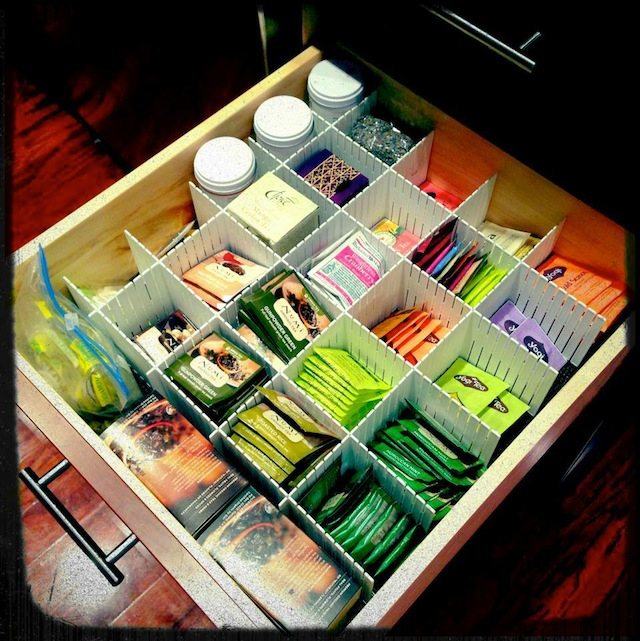 The ancient Chinese tradition of drinking tea dates back thousand of years to the early Chinese dynasties and aristocrats who drank the beverage for its medicinal properties. In ancient times, leaves from the Camellia Sinensis (the tea plant) were either ground into a powder or placed as loose leaves directly into water to infuse it with herbal essence. Unfortunately, modern day tea is nothing like the unadulterated version of old tea. Many of today’s tea brands are operating under the guise of providing health benefits and promoting clean living, but are actually laden with pesticides, toxins, artificial ingredients, added flavors and GMOs.
The ancient Chinese tradition of drinking tea dates back thousand of years to the early Chinese dynasties and aristocrats who drank the beverage for its medicinal properties. In ancient times, leaves from the Camellia Sinensis (the tea plant) were either ground into a powder or placed as loose leaves directly into water to infuse it with herbal essence. Unfortunately, modern day tea is nothing like the unadulterated version of old tea. Many of today’s tea brands are operating under the guise of providing health benefits and promoting clean living, but are actually laden with pesticides, toxins, artificial ingredients, added flavors and GMOs.
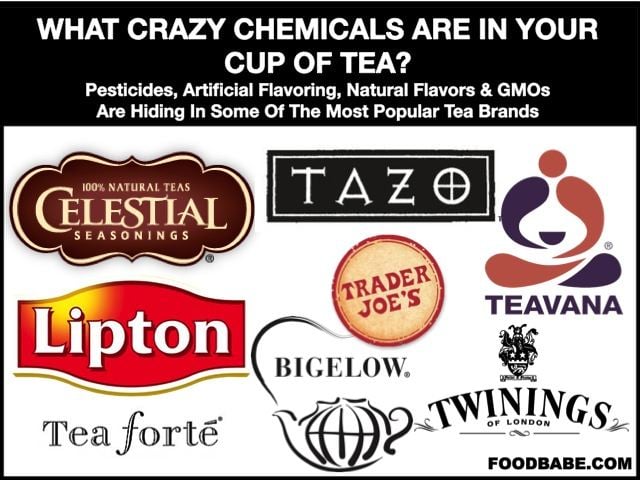
Conventional Teas – An Abundance of Pesticides
Did you know that most tea is not washed before it is put it into bags? That means if the tea was sprayed with cancer-causing pesticides, those pesticides go directly into your cup. And this is the reason why tea is on my organic shopping priority list. To prove this point, here are some shocking facts about one of the most well-known tea brands – Celestial Seasonings.
A recent third-party analysis by Glaucus Research and discussed here found that 91 percent of Celestial Seasonings tea tested had pesticide residues exceeding the U.S. limits. For example, Sleepytime Kids Goodnight Grape Herbal contained 0.26 ppm of propachlor, which is a known carcinogen under California’s Propsition 65.
The “Wellness” tea line was found to contain traces of propargite, also a known carcinogen and developmental toxin. The FDA has already issued two warning letters to Celestial Seasonings in regard to poor quality control according to this source. Imagine what happens when pesticide-laden tea is steeped in boiling water.
If grocery store brands don’t provide a clean option for you, perhaps a high-end loose leaf tea would circumvent some of the issues of grocery store brands. Right? Wrong! Take Teavana, which is found in malls across North America for example. Teavana taps into tea culture with the “Teavana Experience.” Convincing their employees to take customers on a sensory journey – they open a huge canister of loose leaf tea and wave the top of the canister so you can smell the tea – touting all of the wonderful health benefits of tea complete with samples and manipulative demonstrations that end in an expensive visit to the tea shop. Is all the extra money worth it? Are customers getting a superior tea product? No.
Teavana tea was tested by an independent lab and 100 percent of it was found to contain pesticides. One tea in particular, Monkey Picked Oolong, contained 23 pesticides. 77 percent of the teas would fail European Union pesticide import standards, and would be banned from import. 62 percent of the teas tested contained traces of endosulfan, a pesticide that has been banned by the U.S., China, the E.U., and 144 other countries because it has been linked to impaired fertility and could harm unborn babies.
UPDATE (May 27, 2014): Glaucus Research funded the research done by Eurofins Scientific (an independent lab) and admits on their disclaimer that they are biased because they would make money if Hain’s stock declines. However – I am not sure that Eurofins’ research should be completely discounted on this point alone. Since I wrote this post, Celestial has been sued in a class-action lawsuit based on the pesticides that Eurofins found in their teas and for mislabeling of them as “100% Natural”. The jury is still out on whether Eurofins’ research will be considered legit, as this case is still active in California. The Plaintiffs contend that Celestial’s teas contain “pesticides, herbicides, insecticides, carcinogens, and/or developmental toxins (collectively, “Contaminants”)” and Celestial “did not dispute – and has never disputed – that the tea Products contained Contaminants. Nor has (Celestial) challenged the results of the Eurofins Tests” and “has not claimed that Eurofins was biased or that the Eurofins Tests were not, in fact, accurate”. Even if it is determined that Eurofins’ research was not accurate – it’s important to note that Celestial’s tea that was tested is NOT organic and some of this tea is sourced from China. Greenpeace issued a report on the alarming amount of pesticides found on tea from China, followed up by a detailed report on Lipton brand tea from China – in which they recommend only purchasing certified organic tea to avoid these pesticides. Reference law documents: Complaint; Plaintiff’s Memo in Opposition to Motion to Dismiss. Case 8:13-cv-01757-AG-AN
Teas Can Contain Artificial Flavoring, Natural Flavors, and Hidden GMOs
Furthermore, a majority of Teavana teas contain added flavor – specifically “artificial flavoring.” If their tea is so high end, why would they be adding ingredients produced by fractional distillation and chemical manipulation of various chemicals like crude oil or coal tar? Coal tar in my tea? No, thanks.
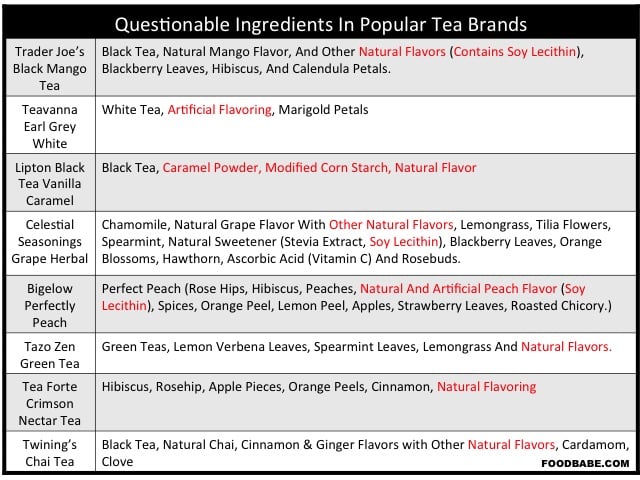
Many popular tea brands get away with using the ingredient “natural flavors” to trick the consumer into thinking they are buying better, cleaner ingredients; however companies are just covering up the inferior taste and low quality of their tea. Fortunately, there are brands that are putting the kibash on the use of natural flavors and using all real ingredients. I was happy to learn that Ahmed Rahim, CEO of Numi Tea is just as disgusted by this ingredient as I am. He said to me “You can breakdown anything that is found in nature and if it ends up tasting like the flavor you wish to use – you can add it to any product and call it NATURAL FLAVOR on the ingredient label. It could come from a stone in the ground and you’d never know.” This is why when I see the words “natural flavor” listed on a label – I put the product down and run far far away. I want to know what I am eating! Don’t you?
Additionally, the added risk of consuming possible GMOs is not something many people think about when consuming teas. Before this investigation and witnessing tea companies using modified corn starch and soy lecithin in tea (additives likely made from genetically engineered corn and soy), I didn’t think about it either! I can’t imagine having a serious soy allergy, considering all the places companies try to hide it.
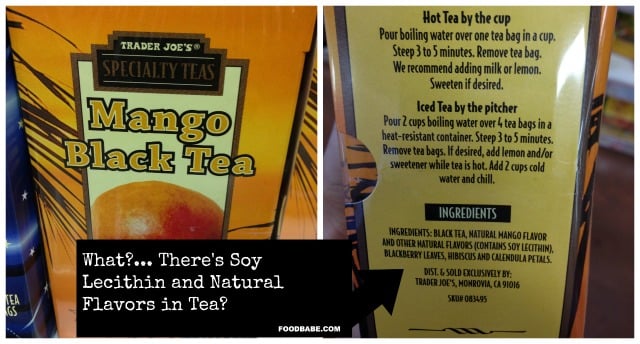
Why The Tea Bag & Packaging Matters
A recent article in The Atlantic discusses the “silky sachet” and “luxurious mesh bags” that hold loose leaf teas (like in brands Tea Forte and Mighty Leaf). Turns out, these modern day bags meant to showcase the tea leaves, are made of plastic.
PLA (polylactic acid) is a (likely GMO) corn-based tea bag material that has attracted major tea companies due to its nice look and its claims of biodegradability. Terms like “silky sachets” and “corn-based biodegradable tea bags” mislead customers into believing a product is more natural and sustainable than it really is. While the processing for PLA removes all traces of genetic material, it is still made with genetically modified corn. Although the actual tea bag is not an ingredient like teas and herbs, it is an element that is put into boiling water.
According to The Atlantic, tea bags are most commonly made from food grade nylon or polyethylene terephthalate (PET) which are two of what’s considered the safest plastics on the scale of harmful leaching potential. However, Dr. Mercola disagrees, he states:
“While these plastics are generally considered among the safest in terms of leaching potential, the molecules in these plastic tea bags may still in fact break down and leach out when steeped in boiling water…” Well, isn’t that how tea is prepared?
Another temperature consumers need to worry about in tea is the “glass transition” temperature. Here’s the science behind the glass transition temperature or, Tg, and why it becomes dangerous according to The Atlantic:
“That is the temperature at which the molecule in certain materials such as polymers begin to break down. As a rule, the Tg of a material is always lower than the melting point. In the case of PET and food grade nylon (either nylon 6 or nylon 6-6), all have a Tg lower than the temperature of boiling water. For example, while the melting point of PET is 482 degrees Fahrenheit, the Tg is about 169 degrees. Both nylons have a lower glass transition temperature than PET. (Remember that water boils at 212 degrees.) This means the molecules that make up these plastic tea bags begin to break down in hot water.”
So, while the plastic itself won’t melt in your tea, the glass transition temperature could potentially leak out harmful phthalates if there are such things in your tea. Another thing to worry about is that some of the newer tea bags are made with a variety of plastics. Some plastics are nylon, some are made of viscose rayon, and others are made of thermoplastic, PVC or polypropylene.
Beware of paper tea bags too, which can be worse than plastic tea bags.
GET THIS: Also according to Dr. Mercola, many “paper tea bags are treated with epichlorohydrin, a compound mainly used in the production of epoxy resins. Considered a potential carcinogen by the National Institute for Occupational Safety and Health2 (NIOSH), epichlorohydrin is also used as a pesticide. When epichlorohydrin comes in contact with water, it hydrolyzes to 3-MCPD, which has been shown to cause cancer in animals. It has also been implicated in infertility (it has a spermatoxic effect in male rats) and suppressed immune function.”
So what do you do the next time you want a cup of tea? Antioxidant rich teas aren’t going to do much to counterbalance the chemicals, additives and artificial flavorings in today’s modern teas.
First, I recommend looking at this chart below to see how your favorite tea brand stacks up:
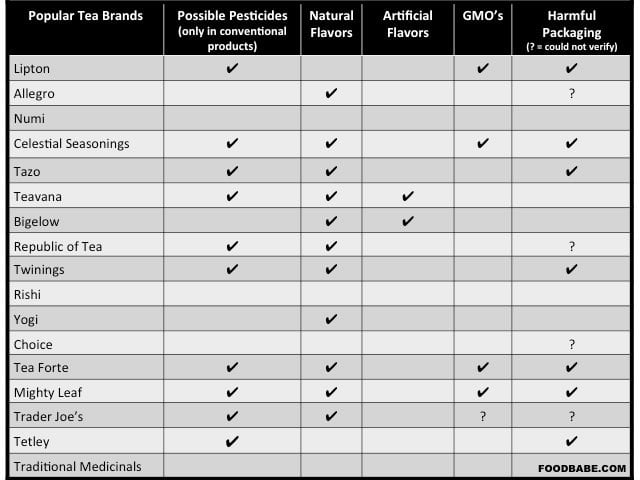
And then when brewing and picking out the safest tea remember these tips:
1. Choose an organic & non-GMO certified brand of tea. (My favorites are Numi, Traditional Medicinals, and Rishi Tea (loose leaf)).
2. Check the ingredient list on the back of the tea package to make sure there are no added flavors, GMO ingredients like soy lecithin and corn starch added to the tea leaves.
3. Make sure the brand you buy uses a safe form of packaging material or buy loose leaf tea and use a stainless steel or glass tea strainer. Have the company verify that bags do not contain epichlorophydrin, and avoid plastic tea bags all together. (Numi and Traditional Medicinals are some of the only brands I trust in this category because they have publicly stated they do not use this harmful ingredient or GMO packaging and are Non-GMO Project verified.)
4. The majority of restaurants use some of the most pesticide ridden tea and brands that have harmful packaging like Celestial Seasonings, Lipton, etc. Don’t fall victim to this. Bring your own tea when eating out or going to restaurants and ask for pot or cup of boiling water (remember to leave a good tip if you do this). I even do this at Starbucks because I like to vote with my dollars and not buy tea brands that are harmful. If you drink iced tea, brew your own at home and carry an insulated water bottle with you.
5. Remember these temps and times for brewing the perfect cup of tea
If you know someone who loves to drink tea, please share this post with them. I was just as shocked as you probably are about all of this craziness – knowing what’s in our tea and what we put in our body matters! Let’s change the world together.
Xo,
Vani


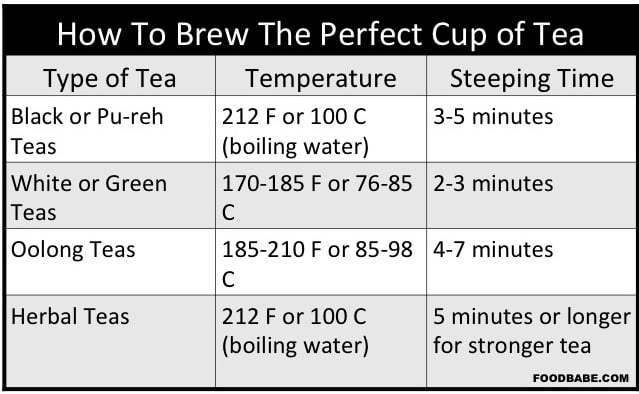



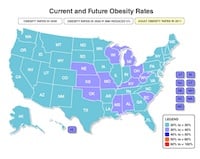


Can you please research and comment about lead in teas also? I’m concerned about that also…thanks
like with most foods, traces of certain metals can be detected in teas from around the world. Good news is (like with pesticide residues) that the transference rate into the brewed tea is very low (for lead it’s way lower than 20% on average according to published data). The lead can get into the tea leaf either from the soil through fertilizer, from old processing equipment, and of course from industrial pollution in the air which is why some Chinese teas close to industrial areas have higher levels compared with teas from other regions and origins. Coming from China it is not uncommon to get a result of 2 or 3mg of lead per kilo. If we assume 3mg (high!) and 20% transference (high!) into a brewed cup of tea then the calculation is 2 grams of tea per cup (typical tea bag weight) and 150 ml boiling water…
= 2/1000 *3*20% =0,0012 mg lead per cup which is 1.2 µg lead per cup. While there is no FDA regulation on lead levels in foods they suggest that an intake of 5,6 µg per day poses no health risk so in my example (which assumes a fairly heavily contaminated tea) you could still drink almost 5 cups per day with no concerns. Hope this helps.
You have not mentioned my two favorite teas, which are Typhoo and PG Tips. Do you know anything about them? Thanks!
Based on this article, are teas from the EU better, since more ingredients are not allowed in the teas? For example I love PGTips from the UK. It is the #1 selling tea in England.
the brands you mention are primarily African blends which have very low heavy metal content compared to the example I made. You should have no health concerns, you can take pretty much any tea and brew it and the metal content in the brew will be below the allowed levels for drinking water…..
Information brought to you by Numi! The healthier, alternative choice!
Where can I find those amazing drawer dividers?
Food Babe, I don’t know how often you read these comments, but please check out http://www.EnglishCottageTea.com for some quality organic, GMO-free teas. She is really commited to providing good quality, clean teas to her customers. BTW, this is not my website and I do not get any compensation for recommending English Cottage Tea, I just think she deserves a shout out on an article about tea. 🙂 Thank you.
Thanks for the link gommymommy. This investigation of tea is one of the most disturbing one’s I have read on food babes blog thus far! I have always thought of tea as one of natures best offerings. I cant believe companies find ways to even mess up tea!!!!!! I found some great organic dried herbs and teas from Manana Organic on Amazon that are reasonably priced, safely packaged, carefully processed, and non GMO.
How about Adagio teas? I just got some from them, and now I’m concerned.
Vani, In your article about Trader Joes (which was awesome, btw) you noted that one of the things you can buy from TJs is Yogi Tea. Here you state it has pesticides…you might want to update your other post.
Thanks for all the helpful info in this post, I am a long time tea drinker, and I no longer will use bagged teas!
I’m confused as to if this article just made me want to completely give up all teas entirely or just say, “Eh, what the hell. Yogi Tea is delicious and makes me feel great so I’ll just continue to drink it.” I’m extremely health conscious, but when the molecular activity in tea bags is something is being discussed as a health hazard, I think I’ll just stop being so afraid of everything and live my life….which includes an abundance of Yogi Tea.
Cara that’s pretty sad. especially since yogi tea makes such a show to seem trustworthy alll over the packaging, and provides us with “inspiring love, health and truth quotes”. that makes it even more disgusting that they’re deceiving And poisoning us.
There Are tea brands that are trustworthy and actually care about their consumers even if they don’t put it up in flashy lights. Foodbabe even specifically mentioned some so why you would continue consuming toxic products and supporting a company that doesn’t mind harming and lying to you is sad indeed.
Kazina, not to start an argument as threads usually escalate to that level, but I’ve done some research on Yogi Tea and their tea bags and, unless they are blatantly lying to us (which they could very well be) I’m curious If you have contacted or researched them, too? The one thing that does concern me about their oxygen bleaching is that I need to research the process more. I’m just as concerned as the other people posting and I’m trying to gather as many reputable facts as I can about one of my favorite brands of teas. 🙂 I’ve tried Numi before and they are pretty good too, but thinking I need to just fins some good, organic, wholesome loose leaf at this point.
Where do you buy these kinds of teas? Live in a small town with one grocery store, have to drive 20 miles to big town with more choices. I have always used just plain Lipton. Does any one know which brand is similar to that and where I could find it?
where I live there is a store called Outpost which is pretty great. They have tons of other products too, though it’s a relatively small store with mostly groceries.
You could do an internet search for any conscientious stores in your area, or order online if there really aren’t any around. =)
Outpost sells Celestial Seasonings Teas so you still have to be careful and do your research when shopping there. 🙁
yes you’re right Pook, Outpost sells too many items that are from masquerading subpar brands.. like “Cheetos Naturals” and other products by popular brands offering supposedly clean products. then there are all the organic and former trustworthy brands that have been bought and likely compromised. it’s good you pointed that out but hopefully people can investigate and find out how to select worthwhile brands on their own. anyways, as for where I live Outpost has a pretty superior roster compared to other places. a good selection, less vast than similar stores, but a much higher concentration and percentile of truly trustworthy offerings.
a lot of organic brands have been bought and if I’m aware I stop buying them.. this site seems to be a decent source about the current situation
http://www.cornucopia.org/carrageenan-2013/
Could you let us know how the Kirkland’s repackaged Ito En brand green tea measure up with your analysis also Pukka tea brand?
I drink at least 10 cups of tea a day. Different brands, different varieties. Generally a mix of green, black, and herbal all day long.
Thanks!
What a well-researched and written article! Thank you for sharing this info! As a tea-lover and health-conscious person, I try to drink mostly organic teas to avoid pesticides, and I always reject “natural flavoring,” but I had never considered the dangers in the packaging!! Thanks for opening my eyes.
Do you know anything about Stash, Triple Leaf, or Organic India (Tulsi)? Thanks!
American Tea Garden
I too wanted to know if Red Rose tea has epichhlorhydrin, and I just got this reply from the company…
Thank you for writing in.
You may be interested in a statement directly from our Director of Quality and Product Development:
“Recently there has been information circulating about the potential negative health effects regarding a component used in tea bags and coffee filter paper. Much of that information has been inaccurate. So to address the issue I am providing the following detail.
The filter paper used in the manufacture of Red Rose tea bags is produced with the latest level of technical knowledge for paper production, which is in full legal compliance for food contact materials. To ensure that tea bags don’t come apart when they are immersed in hot water, a small quantity of wet strength agent is added to the raw pulp before the filter paper sheet is formed. This agent is a highly purified polyamide epichlorohydrin based resin. This polymer resin is cross linked during the paper manufacture and becomes bonded into the paper providing the necessary strength for use in hot water.
We can confirm that the tea bag filter paper does not contain any epichlorohydrin. The filter paper is subject to rigorous quality tests and regularly analyzed to verify compliance with regulatory requirements.”
At Redco Foods, the safety of our tea is paramount in our manufacturing process every single day. So rest assured – continue to enjoy our tea – and thank you for writing!”
Regards,
Ashley Dennin
Red Rose USA
I have now tried two brands of organic, loose leaf Orange Pekoe tea, and I just don’t like them as well as Red Rose tea. So, what to do since Redco Foods won’t even try to address my concern (and others, as evidenced in this blog)? Get my own epichlorhydrin-free filter bags! I cut open the Red Rose bag and dump the tea in to the “safe” filter bag. Problem solved at some expense and hassle. But the real solution – I would be willing to pay the few pennies more for Red Rose tea to be in Epichlorhydrin-free bags.
How do we convince these big companies to manufacture with epichlorhydrin-free bags? Why is Redco Foods convinced that their bags are safe and that the information contained on this website about epichlorhydrin is inaccurate? Why do they say their bags contain no epichlorhydrin and yet in the same paragraph above in their reply to me they say the raw pulp used to make the bags contains epichlorhydrin? Can someone with more knowledge of chemistry explain this apparent contradiction?
Would you please add the information from the following blog about Stash, Numi and Choice teas to your table above?
http://national.cleanplates.com/health-nutrition/these-teas-are-toxin-free/#.UxSysRaKj9B
I was surprised to learn that even Tetley has a pesticide-free and epichlorhydrin-free offering – their green/black tea blend. I wonder if this is available in Canada?
curious to know if you have looked at or will look at Tulsi.
What about Salada Teas by Redco Foods, Inc. ??? They’re part of Unilever…so I am a little hesitant. They came out with a white tea. Which is my favorite kind to drink.
Thanks
I have been drinking Organo Gold grren tea. Do you know if this is a good tea to dringk? Many thanks .
Pleaseeeeee, think a little deeper people. Is there any study (serious study) showing the levels of pesticides in teas which are above or not above the legal limits in U.S. or other country, and which is the dosage, cups per day, that could cause harmful effects if ingested? Did you know that many pesticides, even though they might be detected in tea leaves, are slowly passed to water and in lower concentrations? Which means, that the lower concentrations in leaves are even lower in the water you drink. This Food Babe text about teas and pesticides is just sad (alarmist and sensationalist).
Well, “Omnia venenum sunt: nec sine veneno quicquam existit. Dosis sola facit, ut venenum non fit”.
Thanks Smith. I feel a bit better after reading your sharing. Tea is something I have everyday and after reading those comments, i am wondering what had i put into my stomach the past many years! I have been drinking green tea in office and someone pointed to me it contains “artificial flavour” so i should not drink it! It seems like we have entered into the stage of “living and eating in fear”….
Hello,
Your site is wonderful and so informative. Just got through reading “Do You Know What’s Really In Your Tea?” and it’s pretty shocking. I’m going to definitely pass your site along to friends.
I wanted to share with you http://www.BuddhaTeas.com They are a company in Del Mar, CA that’s about a year old now. I’ve ordered from them several times and am very very pleased with their teas and customer service. In quality and integrity, I place them with Traditional Medicinals. Anyway, I thought you might be interested in checking them out.
Thank you for all that you do,
Lee Burch
Burlington, Vermont
Apparently, according to CBC marketplace tonight, red rose has no pesticides.
From what I recall they said Red Rose Orange Pekoe tea had no pesticides. They did not mention any other flavor
Could you provide the name of the independent study especially on the Tevana tea? This is very troubling and would like more information.
Thank you
I have seen the “independent study on Teavana tea” on Vimeo. It is one company that sent several teas to one lab in Germany. I’ve tried to look into it further, but have been unable to find any verifiable backups or anything other than one (basically YouTube) video from one lab and one (possibly biased, no way to know otherwise) “independent study”. If someone can find other research that proves this, I would love to see it. I love Teavana tea, especially the Silver Yen Zen Pearls, and hate to think that it is poisoned D:
This “report” was done in 2012 right after the purchase of Teavana by Starbucks by a company that shorted Teavana stocks, ie: stood to gain significantly in the event of stock price declines. Teavana made an official statement in response: “Teavana’s teas undergo rigorous third-party testing on each batch of teas based on international food safety standards including European Union regulations, which are widely considered to be the most stringent in the world.
Consistent with that, the Company has established internal procedures and comprehensive third party testing to ensure all tea is safe and within those guidelines.
Teavana refutes the report’s conclusions. The group that published the report is a short-seller and may benefit financially from the allegations in the report.
Teavana’s teas are safe and of the highest quality.” Source: http://www.businessinsider.com/teavana-pesticides-2012-11
Obviously, almost any F&B products have problem in North America when money and greed involved. That is why I don’t drink any tea in North America. Only green tea from Japan. Good luck.
i just came across a direct sale company called “Steeped Tea”. It is sold through independent consultants (like Tupperware, Tastefully Simple, Avon, Scentsy, etc.). My consultant is fairly new, but she said they meet not only US and Canada standards, but also European standards as well (which i know are more strict than US and Canada) – but i don’t recall if these were standards for being natural, organic or what. I guess my question is if anyone has researched this company and has an opinion on the product. The blog above has a lot of information about a lot of companies – but this company isn’t listed on the ‘good’ or the ‘bad’ list. Any info would be appreciated!
What do you know about Dilmah Premium Ceylon tea? I would be interested to know if it is a safe one…
Hi Vani! I enjoyed reading your article and am going to share it on Tribute tea company’s Facebook page. We are a Chicago based company that focuses on sourcing only the freshest, purest whole leaf teas from Asia. We only sell looseleaf teas. I would be happy to send you some samples, if you’d like. We are a small business still trying to grow so I appreciate any support! Like us on Facebook! Thanks!
You have a great website. Thanks. I drink a tea I buy at Costco that is from Japan. It is the famous Japanese brand Ito En and sold under the Kirkland label. It is Green Tea that is a blend of Sencha and Matcha. It is not labeled organic. Have you ever seen anything about this tea?
thanks
Thank you for the research. You may further wish to link to a study done at the University of Alberta concerning off the shelf Canadian teas and heavy metal contamination especially when considering brewing times and/or pregnant women
(http://www.hindawi.com/journals/jt/2013/370460/).
Tea brewer
Is this one safe, even tho its BPA free with the heat involved? I have 2 of them
http://www.adagio.com/teaware/ingenuiTEA_teapot.html?gclid=CO_30-7dkL0CFQaBfgodjksARg
Hi Vani
this research on teabags is so valuable, and I have changed what I am buying.
Today I heard about a study showing that what “big-plastic” is using in “BPA-free” plastic is just as harmful as BPA, would love it if you could look into this.
I know you are already using stainless steel and glass, maybe this info would help others to see why.
here is the link:
http://www.motherjones.com/environment/2014/03/tritan-certichem-eastman-bpa-free-plastic-safe
xo and THANK YOU for all you do!
What about Waghbhari Masala Tea Packets, any thoughts on that Vani ?
How do you find out about pesticides in tea? What about artificial flavors? Can you source it back to the origin? Is all tea tested when it comes in to this country? Thank you.
I hVe 2kinds of loose tea. Malorim Teas and Earth Teaze. Do you know how safe or how contaminated either one of these are? I am throwing out all of my brand name er all teas (Celestial, Twinnings, PC, etc). Thank you for the article, I will indeedass it on.
Hi Food Babe, What a great post on this topic. Thanks for clearing up some issues and your safe recommendations. Sometimes I feel like everything is trying to kill us. I had a question regarding the whole foods teas. I asked about their process and this is what they responded:
Our tea bags are made from wood pulp and compostable raw materials (hardwoods and softwoods) that are “bleached” using either Elemental Chlorine Free and/or Totally Chlorine Free processes.
I don’t understand if it’s safe. What are your thoughts? I’m tempted to lose all tea bags all together. Thanks!
I recommend trying Javita Lean and Green green tea. It’s available in my website: http://www.myjavita.com/javadivacafe
So here in Canada we have David’s Tea which is a premium tea company. I questioned the “natural flavours” on the ingredient list of some teas once. The response I got was that it means that by mixing different ingredients together it makes a new flavour so this is why they have to add it to their ingredient list as “natural flavours”. I’m more educated about these type of things vs the regular consumer so I only buy organic teas, but I just thought that that response was silly. Either their staff is not educated or they are told to say this. Who knows.
Does anyone have any information on the Newman’s Own Organic teas? They are fairly inexpensive and the ingredients say it contains only 100% organic black tea. I am not sure about the bags though, they seem to be paper. Thanks for any info!
After reading this post, I emailed Argo teas , a shop I found while in Chicago. All the corporate office would say is that Argo teas meet FDA standards. This is a low standard and not good enough for me.
Hey foodbabe. Great post! This article really opened up my eyes about tea as I consume them daily and never realised that tea could be so ‘dirty’. I’m currently consuming YourTea or more specifically, TinyTea. I wonder if you could shed some light if they’re safe to consume. Thanks!
I was kicking myself last night bc I went grocery shopping and forgot to pick up Numi tea to try after reading your blog. I love tea.
We have free tea at work, but it’s all the harmful stuff. When I got here this morning, someone had placed a new box of NUMI tea in the tea section of our kitchen. I have NEVER seen anyone drink this type of tea before. It’s fate!!
Just curious, Bigelow I see is listed here as having EVERYTHING to avoid (SO SAD!!!) But I purchased a box from BJ’s that says it is organic, is this something recent? And if so what negative things are lurking in my green tea?
Just FYI, Rishi tea has “natural flavours” too.
List of GMO-Free Brands~~~~~~~~~ http://gmo-awareness.com/shopping-list/gmo-free-brands/
We are offering Numi and Harney & Sons organic, GMO-free, fair trade teas after discovering how important it is to eliminate as many harmful ingredients from our food as possible. Please check out our store for these great products!
Ann
I just wanted to alert you to an error in your posting. As I was looking for a new tea since mine have undesirable additives, I noticed that a few that you mentioned as ” clean” are not. I found several of the flavors of the Traditional Medicinal and Richi brands have natural flavoring. It is not marked that way on your graph or in your statements. I wonder if you are aware of this?
Curious about Stash tea?
I love this article. It is one of many that actually led me to the company Steeped Tea after tying a loose tea in the mall, loving it, then finding out it contained a LOT of things I did not want to drink.
Thank you sooo much for writing this article. It helped me make great decisions and I am feeling fantastic since including tea into my diet.
Amanda B
I buy my tea from TJMaxx and Marshall’s! They have a great selection of organic, non-GMO teas, surprisingly! I like Pukka, Tea of Life, and Zhena’s Gypsey Teas. A package of any of their teas averages at $5. I love it.
This is exactly why I only buy/drink USDA certified organic tea. My favorite source for organic loose leaf tea is http://www.CaliforniaTeaHouse.com
What do you know about Badia Natural Herb Tea!
Thanks for the info. I drink Matcha frequently. I bet pesticides are even more concentrated in it >_<
Carnitine is by far one of my favorite fat loss supplements (and an overall favorite nutritional supplement).
First of all you must carry out this as a high priority.
Though emotions can cause biochemical changes as even mainstream medicine
acknowledges that the body cannot be separated from the mind.
Whole grain breads, cereals and pastas have high amounts of thiamin.
Part of the confusion about superfoods comes from the fact
that they are often backed up by some legitimate scientific research; however, the conclusions may be blown way out of proportion, becoming dubious
claims eagerly accepted as fact. You need to have a number of superfoods in your diet daily.